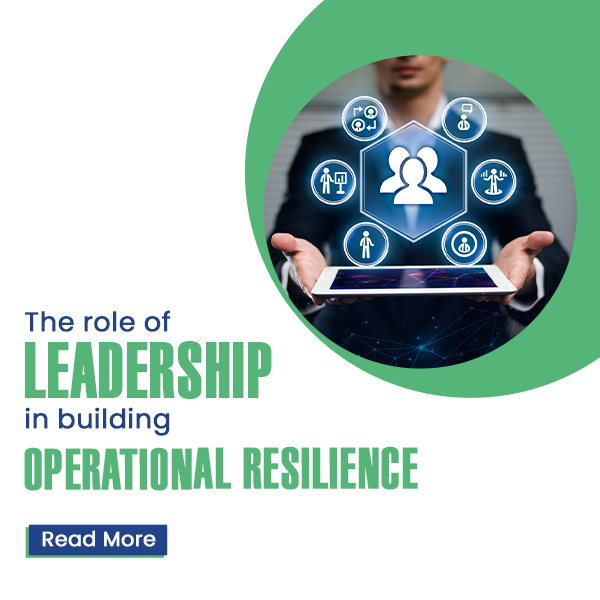Operational resilience has emerged as a critical component of an organisation’s capacity to deal with setbacks and become stronger in the fast-paced, uncertain business climate of today. As a matter of fact, it encourages a culture of adaptability and instills a commitment to continuous improvement. This multifaceted approach not only enhances the organization’s ability to anticipate and respond to challenges but also contributes to long-term resilience and sustained success.
What is leadership in operational resilience?
Because leadership in operational resilience involves fostering the capacity of an organization to foresee, plan for, react to, and recover from interruptions to maintain the provision of critical services and operations,
Although, to achieve this resilience, leaders must build rigorous risk management procedures. Additionally, they need to foster cross-departmental collaboration and set a clear vision to cultivate a resilient culture.
Leadership Training in Resilience
Leadership in operational resilience training means gaining a thorough understanding of the key operations of an organisation, identifying shortcomings, and implementing strong plans in place to keep things running smoothly even in the face of disruptions.
The critical role of leadership in building operational resilience
Above all, we will explore the crucial role that leadership plays in fostering operational resilience and how it advances a company’s long-term success.
1) Inspired Leadership
Furthermore, this strategy sets the foundation for an organization’s ability to foresee, plan for, react to, and recover from interruptions, ensuring the continuity of critical services and operations.
2) Risk management and strategic planning
In strategic planning and risk management, leadership is essential for identifying possible disruptions and creating all-encompassing plans to mitigate them. Overall, leaders play a crucial role in ensuring the organization’s preparedness to navigate uncertainties and maintain operational continuity.
3) Adaptability in Leadership
However,Operational resilience in a fast-paced business environment depends heavily on adaptability. Leaders need to be adaptable in their thinking and prepared to change course as needed.
4 ) Transparency and Communication
An essential component of operational resilience is open and honest communication. In times of crisis, open and sincere communication fosters trust and guarantees that all parties are in agreement. Moreover, leaders who empower their people to overcome obstacles together cultivate open communication environments. Additionally, this not only strengthens collaboration but also enhances the overall resilience of the organization, fostering a culture of transparency and adaptability.
5 ) Building a Culture of Resilience
Leadership plays a pivotal role in establishing the culture of the company. Furthermore, it shapes the values and norms that guide the organization, influencing the behavior and mindset of its members.
6) Investing in Talent Development
The abilities and competencies of the labor force have a direct impact on operational resilience. Therefore, leaders need to make ongoing investments in their teams’ growth. Chiefly, this ensures that they have the expertise and abilities necessary to handle intricate circumstances effectively.
7 ) Continuous Improvement
Leadership is an ongoing journey of improvement. However, effective leaders regularly evaluate and refine their strategies for building operational resilience. This involves learning from past experiences, staying informed about industry trends, and being open to feedback. By fostering a culture of continuous improvement, leaders position their organizations to evolve and thrive in an ever-changing landscape.
Benefits of leadership in operational resilience
An organization’s capacity to foresee, plan for, react to, and recover from disturbances is referred to as operational resilience. In this setting, effective leadership has various advantages and is essential to improving operational resilience. Additionally, robust leadership not only ensures proactive measures are in place but also fosters a culture of adaptability and continuous improvement, further enhancing an organization’s ability to navigate challenges successfully.
1) Strategic Vision
Leadership, through providing the organization’s strategic vision, plays a pivotal role in the identification of possible hazards and disruptions.
2) Risk management
By fostering a culture of risk awareness throughout the company, leaders make sure that workers of all stripes are aware of risks and actively involved in their mitigation. Certainly, this approach not only enhances the overall risk management strategy but also promotes a collaborative and proactive mindset among employees.
3 ) Decision-making and Crisis Management
In emergencies, having strong leadership is essential. To minimize the effect on operations and address interruptions, leaders act quickly and with knowledge.
4 ) Resource Allocation
This comprises the money, people, and other essential resources needed for operational resilience.
5 ) Adaptability and Innovation
Resilient leaders foster an organization’s culture of innovation and adaptation. This, in turn, makes it possible to create adaptable methods that can change as conditions do.
6) Employee Engagement and Training
Moreover,leadership plays a key role in ensuring that employees are well-trained and informed about operational resilience measures.
Key takeaways
In the realm of leadership and operational resilience, leaders act as the compass that guides organizations through uncertainty. Moreover, visionary leaders who prioritize strategic planning, adaptive thinking, transparent communication, and a resilient culture create a foundation for long-term success. This multifaceted approach not only ensures immediate responsiveness but also fosters a sustainable and adaptable organizational ethos.
Our resilience management platform, “AutoResilience“, is industry-leading and has four modules for risk, crisis, business continuity, and cyber resilience. Analysts like Gartner and Forrester have recognized our contributions, as we have helped numerous banks globally reduce the impact of disruptions, ensure regulatory compliance, and safeguard their reputations.














